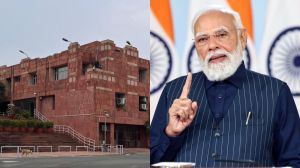145;Oldest democracy supports maximum dictators146;
Two weeks after Saddam Hussein invaded Kuwait in August 1990, Inder Kumar Gujral took a circuitous route to Baghdad. Grappling with the prob...

Two weeks after Saddam Hussein invaded Kuwait in August 1990, Inder Kumar Gujral took a circuitous route to Baghdad. Grappling with the problem of evacuating 170,000 Indians from conquered Kuwait, then External Affairs Minister stopped over at Washington. Secretary of State James Baker told Gujral: 8216;8216;Mr Minister, oil is our civilisation and we will not let any demon sit on it.8217;8217;
Thirteen years later, with Gulf War II underway and Baker8217;s words still ringing in his ears, Gujral has joined the anti-war brigade though he knows this war is not about oil alone. Though foreign policy shapers haven8217;t forgiven him for hugging Kuwait8217;s invader, Gujral maintains that single gesture was no boo-boo: 8216;8216;What did you expect me to tell a Head of State? Look, I want my 200,000 people out but I won8217;t touch you? Parliament gave me a standing ovation when I got back.8217;8217;
Speaking to The Indian Express, Gujral said India 8216;8216;walked the tightrope8217;8217; in the last war. 8216;8216;We had 170,000 of our own stuck in Kuwait and another 35,000 in Iraq. For us, the evacuation of these people was of prime importance. Imagine what would have happened if war had begun with the bombing of Kuwait. How would we have pulled them out?8217;8217;
8216;8216;There was pressure but we kept in tune with the UN sentiments. There were some differences but I permitted American overflights. Their forces were coming from the Far East, from bases in the Philippines and elsewhere, to get into West Asia. Our biggest achievement was we succeeded in evacuating everyone who wanted to get back before war began.8217;8217;
Hard realities, he said, dictated Indian relations with Iraq. 8216;8216;I cannot think of a more foolish person than Saddam. For 10 years, he fought the Iranians. Then he went to Kuwait. And then there was another 10-year spell of post-Kuwait sanctions before this war. He was an authoritarian dictator, someone who would not let anything grow under his feet.8217;8217;
8216;8216;We have our interests in Iraq and the stand in Parliament represents the sentiments of the people. We don8217;t decide our foreign policy on the basis of what Washington does. Saddam was a dictator but remember he was on our side when it came to Kashmir. Also remember that the oldest democracy in the world supports the largest number of dictators. We have to watch our interests.8221;
8216;8216;We were opposed to war and were in favour of taking all action under the auspices of the UN. We were in favour of inspections, destruction of weapons of mass destruction if they were found. Our parameters were defined. I supported our government stand.8221;
8216;8216;And I can8217;t think of any other war, where reaction has been so universal. Even in the US, there have been protests. Public sentiment is definitely not in tune with American policy.8217;8217; Gulf War II, the former prime minister said, should be viewed in the backdrop of the Israeli-Palestinian issue, US attempts at 8216;8216;de-Russification8217;8217; of Central Asia and the entry of China into Central Asia, particularly Kazakhstan.
The post-Saddam era in Iraq, Gujral pointed out, would pose new challenges given the sharp ethnic divides. 8216;8216;Speedy settlement of people in a democratic Iraq should be in everyone8217;s interests. The new government in place should be credible enough, particularly in handling its resources.8217;8217;
- 01
- 02
- 03
- 04
- 05































